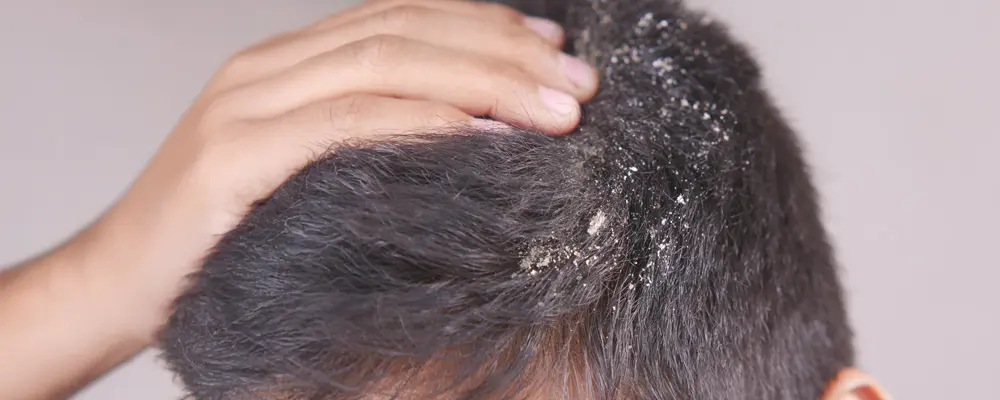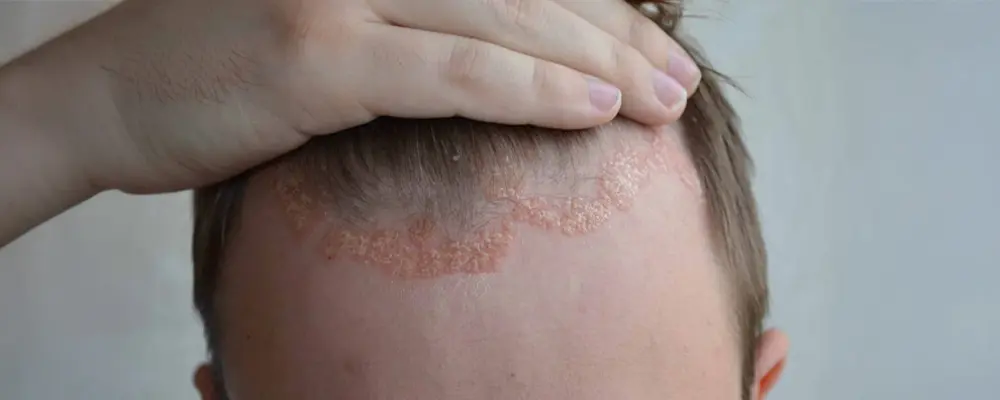Dandruff: A Common Scalp Condition

Dandruff, also known as seborrheic dermatitis in more severe cases, is a non-contagious condition that causes dry, flaky skin on the scalp. Although it can be embarrassing, dandruff is generally harmless to overall health.
Symptoms of Dandruff
- Small, dry, or greasy flakes of skin.
- Flakes that often fall onto shoulders or clothing.
- Mild itchiness on the scalp.
Sometimes, dandruff may indicate another underlying condition, such as eczema, fungal infections, or even psoriasis. If over-the-counter shampoos do not resolve the symptoms, it’s advisable to consult a healthcare provider.
Causes of Dandruff
- Overgrowth of a yeast-like fungus called Malassezia.
- Sensitivity to hair care products.
- Dry or oily skin conditions.
- Environmental factors such as cold weather.
Scalp Psoriasis: A Chronic Condition

Psoriasis is an autoimmune disorder that causes skin cells to build up rapidly, resulting in thick, scaly plaques. It is estimated that around 45 to 56% of individuals living with psoriasis experience scalp psoriasis.
Symptoms of Scalp Psoriasis
- Thick, reddish patches or silvery-white scales.
- Intense itching, which may lead to scratching and bleeding.
- Burning or soreness.
- Temporary hair loss in affected areas.
Scalp psoriasis may extend beyond the hairline to the forehead, back of the neck, or around the ears. Unlike dandruff, psoriasis symptoms are often accompanied by systemic inflammation.
Causes of Psoriasis
- Overactive immune system that causes the skin cells to grow too quickly.
- Genetic predisposition.
- Triggers such as stress, infections, and extreme temperatures.
Also Read: Psoriasis on Feet: Symptoms, Causes, Pictures, and Treatment
Key Differences Between Scalp Psoriasis vs. Dandruff
In numerous past articles, individuals have mentioned initially confusing their scalp psoriasis with dandruff. While the symptoms can overlap, there are distinguishing features between the two conditions. Before diving into the details of treatment strategies, here’s a quick reference table to help you understand the key distinctions between dandruff and scalp psoriasis:
| Feature | Dandruff | Scalp Psoriasis |
|---|---|---|
| Flakes | Dry or greasy, small flakes | Thick, silvery-white scaling patches |
| Itching | Mild to moderate | Intense, often accompanied by soreness |
| Skin Appearance | No redness beneath the flakes | Red, inflamed patches under scales |
| Spread | Confined to the scalp | Can spread to face, neck, or ears |
| Severity | Milder, manageable with OTC products | Chronic, often requires specialized treatments |
Treatment Strategies: Scap Psoriasis vs. Dandruff
Treating Dandruff
For most people, dandruff can be effectively managed with over-the-counter products.
Shampoos with Active Ingredients:
- Zinc pyrithione: Reduces fungal growth.
- Salicylic acid: Helps shed dead skin cells.
- Coal tar: Slows skin cell turnover (may cause discoloration in lighter hair).
Self-Care Tips:
- Follow shampoo instructions carefully for maximum effectiveness.
- Use products less frequently as symptoms improve, but stopping entirely can cause dandruff to return.
- Avoid scratching the scalp to prevent irritation.
Treating Scalp Psoriasis
Scalp psoriasis often requires more robust treatment plans, including:
Topical Treatments:
- Corticosteroids: Highly effective in reducing inflammation and itching.
- Medicated Shampoos: Shampoos containing clobetasol propionate can alleviate symptoms.
- Scale-Softening Agents: Salicylic acid or urea-based products make removing plaques easier.
- Calcipotriene: A synthetic vitamin D3 cream that can be used in combination with steroids.
Advanced Therapies:
- Excimer Laser: Targets specific areas of the scalp with UV light.
- Biologic Medications: Reduce the immune response that causes psoriasis.
- Systemic Drugs: Options like cyclosporine or acitretin are reserved for severe cases.
Self-Management Tips: Scalp Psoriasis vs. Dandruff
For Scalp Psoriasis
- Avoid picking or scratching at plaques to prevent infections.
- Manage stress through relaxation techniques like yoga or meditation.
- Apply shampoos or topical treatments gently.
For Dandruff
- Use dandruff shampoos as directed.
- Be cautious with products like coal tar, as they can cause scalp sensitivity.
- Adjust shampooing frequency based on hair type and ethnicity.
Also Read: Psoriasis Self-Care: Your Guide to Managing Symptoms Effectively
When to Seek Medical Attention: Scalp Psoriasis vs. Dandruff
For Dandruff
- Symptoms persist after using over-the-counter products for over a month.
- Flakes are accompanied by redness or irritation.
For Psoriasis
- Severe itching, cracking, or bleeding develops.
- Symptoms extend beyond the scalp or worsen over time.
- Current treatments have become less effective.
A dermatologist can help diagnose between scalp psoriasis vs. dandruff and recommend the most effective treatments for long-term relief.
Conclusion
Scalp psoriasis vs. dandruff share similarities but differ significantly in their causes, symptoms, and treatments. Dandruff is usually manageable with over-the-counter products, while scalp psoriasis often requires specialized care.
If you’re struggling to differentiate between the two, consult a healthcare professional. Early diagnosis and tailored treatments can improve your quality of life and restore scalp health.




